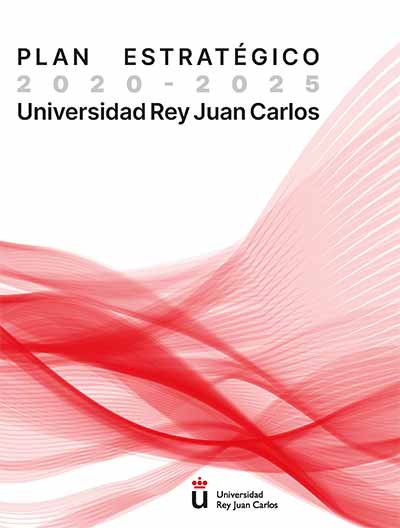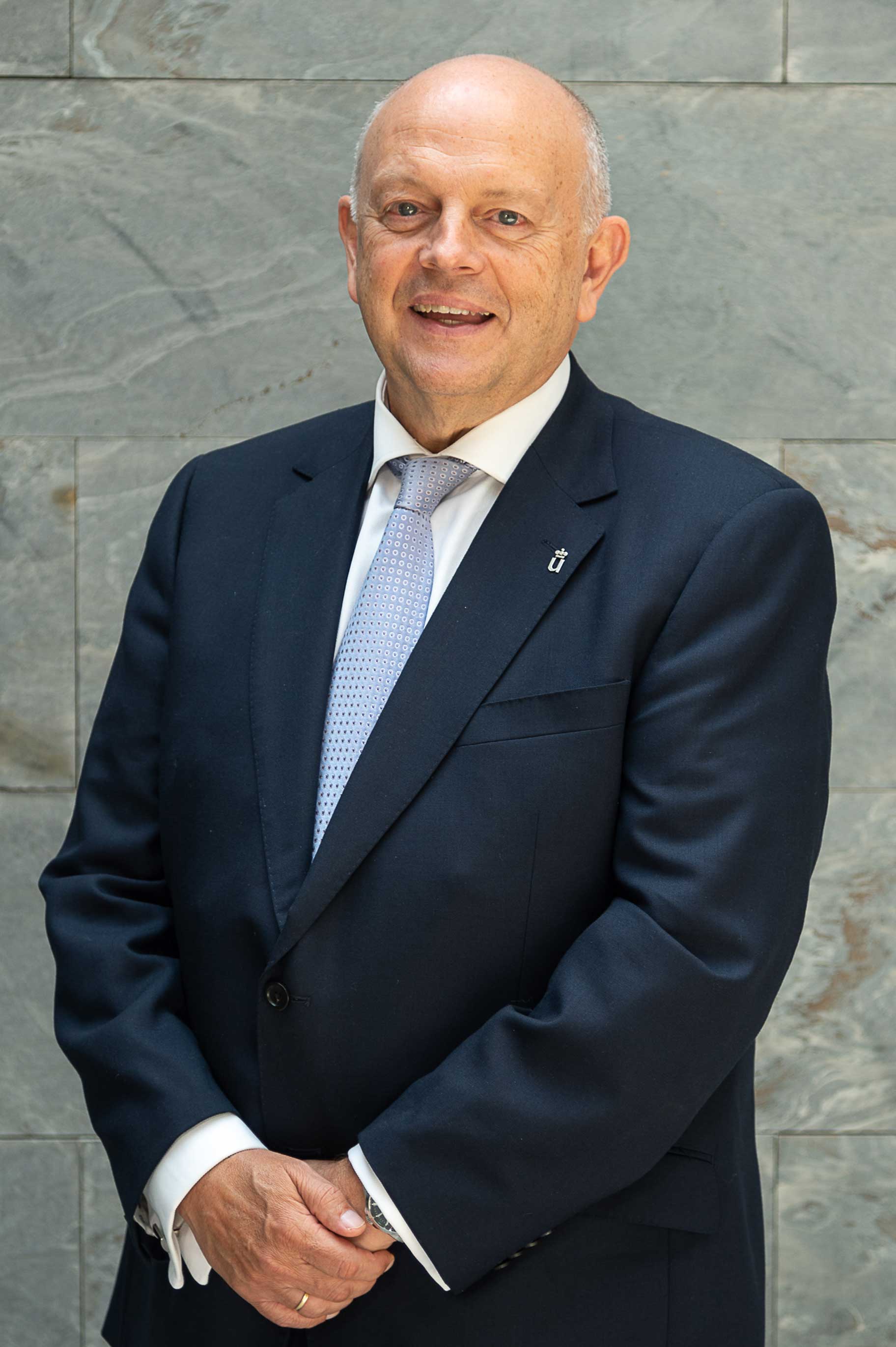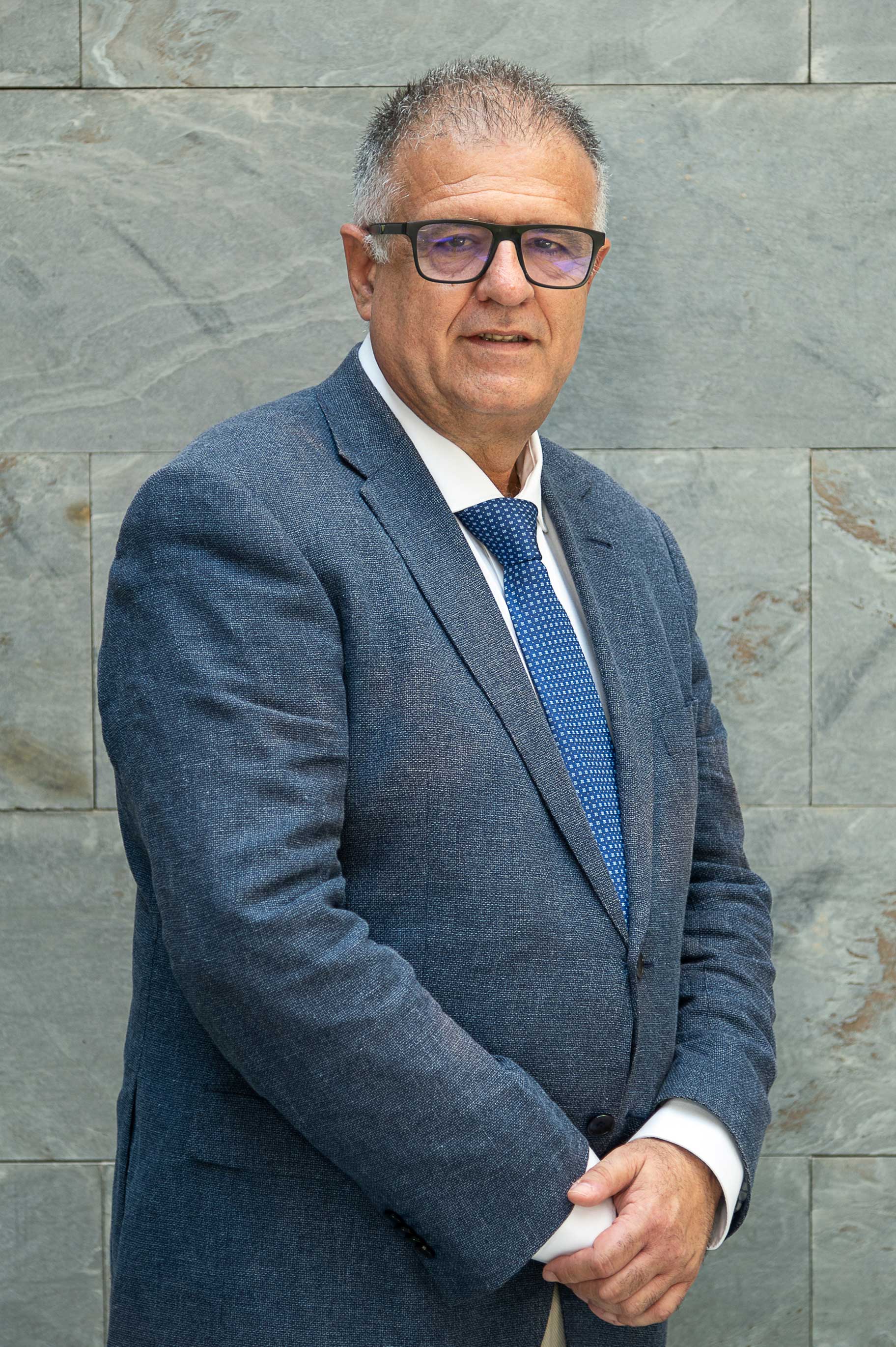- I+D+i
- Innovación y Transferencia
- Servicion de Investigación
- OPE
- CINTTEC
- HRS4R
- Mentoría para la Investigación Euriclea
- Centro de Atracción e Internacionalización del Talento Investigador (CAIT)
- Convocatorias RRHH
- Proyectos I+D+i
- Programa propio investigación
- Infraestruturas de apoyo a la investigación
- Ética de la Investigación
- Comisión de Investigación
- UCC+i
-
UNIVERSIDAD
- Presentación
- Órganos de gobierno unipersonales
- Órganos de gobierno colegiados
- Campus
-
Facultades y Escuelas
- Facultad de Ciencias de la Salud
- Facultad de Ciencias de la Comunicación
- Escuela Superior de Ciencias Experimentales y Tecnología
- Escuela Técnica Superior de Ingeniería Informática
- Escuela de Ingeniería de Fuenlabrada
- Escuela Internacional de Doctorado
- Escuela de másteres oficiales
- Facultad de Ciencias Jurídicas y Políticas
- Facultad de Ciencias de la Educación y del Deporte y Estudios Interdisciplinares
- Facultad de Ciencias de la Economía y de la Empresa
- Facultad de Artes y Humanidades
- Departamentos
- Unidades y Servicios Centrales
- Profesores e investigadores
- Institutos y Centros
- Centros Adscritos
- Sostenibilidad
- Calidad
- Canal Ético
- Alumni
- ESTUDIOS
-
ESTUDIAR EN LA URJC
-
Menu-Estudiar-En-La-Urjc (item1)
-
Grado
Pruebas de acceso
Estudios de grado
Movilidad
-
-
Menu-Estudiar-En-La-Urjc (item2)
-
Postgrado
Másteres
Doctorado
Formación Continua
-
-
Menu-Estudiar-En-La-Urjc (item1)
-
I+D+i
- Vicegerencia de Investigación e Innovación
- Centro de Apoyo Tecnológico (CAT) y RedLabU
- Unidad de Cultura Científica y de la Innovación (UCC+i)
- Servicio de Gestión Económica de la Investigación
- Contratación de Personal de Investigación
-
 Sello HRS4R
Sello HRS4R
-
 Mentoría para la investigación Euriclea
Mentoría para la investigación Euriclea
- Centro de Atracción e Internacionalización del Talento Investigador (CAIT)
- Calendario de Convocatorias
- Investigación
- Innovación y transferencia
- Servicio de investigación
- OPE
- CINTTEC
- Programa propio investigación
- Proyectos I+D+i
- Ética de la investigación
- Comisión de Investigación
- INTERNACIONAL
- ACTUALIDAD
- 1
Plan estratégico URJC 2020-2025
Introducción
El Claustro de la Universidad Rey Juan Carlos, consciente de la necesidad de contar con un plan estratégico que permita trazar un camino desde lo que somos a lo que queremos ser, acordó, en su sesión del día 6 de junio de 2019, la creación de la “Comisión para la elaboración del Plan Estratégico 2020-2025 de la Universidad Rey Juan Carlos”. Esta comisión de redacción, constituida con representantes de los diferentes sectores del Claustro, ha colaborado con el Vicerrectorado de Planificación y Estrategia en la redacción del mismo que en este momento presentamos a toda la Comunidad Universitaria.
Presentación del Plan Estratégico
El carácter finalista de todo plan estratégico se formaliza en la definición de los objetivos estratégicos, que tienen que ser consistentes con la misión y la visión institucional. El Plan Estratégico de la URJC 2020-2025 define 10 objetivos estratégicos agrupados en torno a cuatro ejes. Los ejes estratégicos ordenan y categorizan los ámbitos en los que se concentran las principales actividades de la universidad.
En primer lugar, se ha definido el llamado Eje Estratégico de Docencia, que incorpora dos objetivos estratégicos, uno relacionado con la mejora de la calidad de nuestra docencia de grado y otro relacionado con la docencia de posgrado. En segundo lugar, se presenta el Eje Estratégico de Investigación y Transferencia de Conocimiento, que cuenta a su vez con otros dos objetivos estratégicos, el que busca mejorar la productividad científica de la URJC y el que está orientado a ampliar la transferencia de conocimiento y tecnología a todos los agentes sociales. El tercer Eje Estratégico es el de las Personas y los Recursos. Este eje cuenta con tres objetivos, el primero que aspira a aumentar y diversificar la financiación de la URJC para que pueda competir en igualdad de condiciones con las mejores universidades públicas de España, el segundo de ellos que busca avanzar en la estabilización y mejor organización de nuestra plantilla de personal de administración y servicios y personal docente e investigador y, por último, el objetivo que pretende optimizar el uso eficiente y el crecimiento racional de nuestras infraestructuras (tanto de edificios como de equipamiento) para ayudar a la docencia multidisciplinar y la investigación que desarrollamos en cada uno de nuestros campus.
Por último, está el Eje de Desarrollo Institucional, Gestión y Buen Gobierno que plantea también tres objetivos. El primero de ellos para mejorar la comunicación institucional, con la idea de lograr transmitir a los agentes externos las fortalezas de la URJC y mejorar el orgullo de pertenencia a la institución. El segundo objetivo apuesta activamente por una gestión más estructurada y transparente, simplificando al máximo los procesos a través del impulso de la digitalización y el último de los objetivos, que quiere lograr una universidad accesible para todos, crítica y plural, que apueste por la igualdad de género, saludable y respetuosa con el medio ambiente, siempre comprometida con el desarrollo y la transformación social.
La redacción del Plan Estratégico 2020-2025 de la Universidad Rey Juan Carlos contempló un proceso participativo en el que, a partir de un borrador de trabajo, toda la Comunidad Universitaria pudo hacer llegar sus aportaciones y contribuir activamente, de este modo, al documento final.
sedes
Madrid-Manuel Becerra
Estudios en la sede
Facultad de Ciencias de la Economía y de la Empresa
Grados:
Dobles Grados:
En la URJC podrás también estudiar un Máster Universitario o un Título propio con los que ampliar tu formación, y conocer nuestra Escuela Internacional de Doctorado. Consulta todos los grados de la URJC por rama de conocimiento.
Gestión y organización
GERENCIA
María Teresa Martín del Peso
Correo electrónico:
Secretaría de Alumnos: 91 665 50 60
Buzón de Ayuda al Estudiante
Contacto:
Universidad Rey Juan Carlos
Pza. Manuel Becerra, 14
28028 Madrid
Tel.:91 488 8324
Madrid-Quintana
Estudios en la sede
Escuela Técnica Superior de Ingeniería Informática
En la URJC podrás también estudiar un Máster Universitario o un Título propio con los que ampliar tu formación, y conocer nuestra Escuela Internacional de Doctorado. Consulta todos los grados de la URJC por rama de conocimiento.
Facultad de Ciencias de la Comunicación
Habla Inglesa:
En la URJC podrás también estudiar un Máster Universitario o un Título propio con los que ampliar tu formación, y conocer nuestra Escuela Internacional de Doctorado. Consulta todos los grados de la URJC por rama de conocimiento.
Gestión y organización
GERENCIA
María Teresa Martín del Peso
Correo electrónico:
Secretaría de Alumnos
Contacto:
Universidad Rey Juan Carlos
C/ Quintana, 21
28008 Madrid
Tel.:91 488 4640
Equipo de gobierno
EQUIPO DE GOBIERNO
RECTOR
VICERRECTORES
Víctor Cano, Rosalía LLamas, Víctor García y Patricia de la Vega
Licenciados en Ciencias Ambientales, Móstoles.
- Socios fundadores de GAIA, Gestión Ambiental Integrada S.L.L
El equipo de GAIA se conoció cuando sus cuatro integrantes estudiaban la carrera de Ciencias Ambientales en la Universidad Rey Juan Carlos y fue entonces cuando decidieron poner en marcha su propia consultoría ambiental.
VICTOR GARCÍA LOPEZ, más de tres años de experiencia en el mundo de la hidrología. Ha trabajado para un proyecto europeo de investigación, encargado de evaluar la afección del cambio climático a los ríos mediterráneos portugueses y en la Confederación Hidrográfica del Tajo, en la redacción de un plan hidrológico conjunto para las cuencas españolas y portuguesas como técnico de laboratorio.
PATRICIA DE LA VEGA BLÁZQUEZ, más de tres años de experiencia como Técnico en Sistemas de Gestión, realizando la implantación, mantenimiento y defensa de auditoría de Sistemas de Gestión Ambiental, Calidad, I+D+i, Eficiencia Energética y OHSAS; llevando a cabo gestiones administrativas medioambientales con las instituciones públicas y asesorando en materia de Prevención de Riesgos Laborales. Experiencia en el ámbito de la Educación Ambiental, colaborando con Amigos de la Tierra en el diseño y ejecución de talleres ambientales infantiles. Colaboración en páginas web en la redacción de artículos sobre medio ambiente.
ROSALÍA LLAMAS MORENO, más de un año de experiencia en Sistemas de Gestión, realizando la implantación, mantenimiento y defensa de auditorías de Sistemas de Gestión Ambiental y Calidad, Eficiencia Energética y OHSAS. Formadora de Educadores Ambientales (AEEA), con dos años de experiencia, colaborando con el Ayuntamiento de la Cabrera y el Centro Turístico Villa San Roque, realizando rutas verdes y sesiones de educación ambiental, así como elaborando proyectos socioeducativos para asociaciones y ONG`s. Colaboradora del Proyecto Integral Agroecológico de la “Huerta de las Flores”. Coautora del Estudio sobre la diversidad y dinámica de arañas (aranae) en las Tablas de Daimiel, creando un punto de referencia para la conservación y gestión de este humedal. Amplia experiencia en el sector comercial.
VÍCTOR CANO GARCÍA, ha trabajado para un proyecto global de investigación en Algarve (Portugal), encargado de cuantificar cómo afecta la relación entre recursos y herbívoros en la producción de biomasa, transferencia trófica y forzamiento abiótico en pastos marinos (Zostera). Ha colaborado en un proyecto sobre acuicultura y ganadería marina en Algarve (Portugal), relativo a la cría y crianza de Holothuria arguinensis.
GAIA Gestión Ambiental Integrada, surge a partir de la experiencia adquirida de GAIA Waste Management (Chile), adaptada por Rosalía Llamas Moreno, Víctor Cano García, Patricia de la Vega Blázquez y Víctor García López. Su creación se sustenta en el entendimiento del medio ambiente como un todo y la importancia de involucrar este concepto en las actividades humanas. Centra su actividad en la búsqueda de alternativas sostenibles, a la vanguardia de la Gestión Ambiental Integrada, entendiendo por “integrada” la conjunción de la mayor parte de las disciplinas que intervienen en dicha gestión.
Entre los servicios prestados por GAIA destacan los Sistemas de Gestión Ambiental, la Gestión de Residuos, los Estudios Hidrológicos, la Educación Ambiental y los Estudios de Impacto Ambiental. Además de las actividades mencionadas, los fundadores dan especial relevancia a la divulgación y a la investigación.
El paso por esta universidad ha sido decisivo en sus vidas. Aquí se conocieron, crecieron personal y profesionalmente e iniciaron un fuerte vínculo de confianza y amistad que ha desembocado en un proyecto común para su desarrollo profesional. Actualmente mantienen relaciones con la URJC mediante trabajos concretos, jornadas formativas y la acogida en su empresa de alumnos en prácticas.
"Nuestro paso por la Universidad nos ha permitido no sólo disfrutar de unos años maravillosos. Nos ha permitido crecer personal y profesionalmente”
GEC - USA Cultural Exchange Programs
Programas internacionales de prácticas remuneradas en USA para alumnos y egresados de cualquier titulación de la URJC. GEC - USA Cultural Exchange Programs
Estancias de 3 y 12 meses. Visa americana J-1 (International J-1 Exchange Visa Program). Sponsor americano. Distintas opciones de localización dentro de los estados de USA
Estas prácticas no serán reconocidas como prácticas externas académicas ni podrán formalizarse desde la Unidad de Prácticas Externas.
Programas de trabajo y prácticas en USA:
- Summer Work and Travel USA. Estancias durante el verano.
J-1 Visa Summer Work and Travel. Summer Work and Travel USA Program
- Intern / Trainee USA. Prácticas de 12 meses
J-1 Visa Intern and Trainee. 12 month program
- Teach in the USA. Oferta programa profesorado de 3 años
Solicitud:
Los interesados deben enviar su CV en ingles a Caroline Maluf
Más información en: https://www.gecexchanges.com/
Requisitos para participar en el programa
- Ser alumno universitario o egresado
- Alto nivel de inglés
- Personalidad positiva y pro-activa
Estancias
- Estancias de 3 meses en verano
- Estancias de 12 meses con rotaciones
- Estancias de 3 años
Remuneración:
La remuneración oscila entre los $12 y los $24 USD por hora de prácticas, dependiendo de la localización, departamento y experiencia.
En caso de ser seleccionado, el candidato deberá confirmar su deseo de participar para que se puedan iniciar los trámites de la VISA-J-1.
Contacto URJC:
Soledad Carretero
Servicio de Relaciones Internacionales
Universidad Rey Juan Carlos
Despacho 109, 1ª planta, Rectorado - Móstoles
C/ Tulipán, S/n, 28933 - Madrid - España
Teléfono: +34 914887071 (ext. 7071)
e-mail:
A new 'cloud' platform to reduce the test time for software projects for large systems
A new 'cloud' platform to reduce the test time for software projects for large systems. The ElasTest Project offers an "open source" platform for carrying out tests "end-to-end" in a rapid and reliable manner, thereby increasing the efficiency and effectiveness of the software testing process and the quality of the system that is being tested. The ElasTest platform will supply capacity for carrying out advanced tests which will help to increase the scalability, robustness, security and quality of experience of currently distributed systems. In short, it will allow any development team to create faster software with fewer defects. The new cloud platform will furthermore create a community of users and contributors around it who can contribute to the task of transforming ElasTest into a worldwide reference standard in the field of systems testing in the cloud. The ElasTest Consortium is managed by Universidad Rey Juan Carlos and includes among its members the Technische Universität Berlin, the Centro Consiglio Nazionale delle Ricerche, Zurich University of Applied Sciences and Fraunhofer FOKUS. It also enjoys the participation of different institutions from industry such as Atos Spain, IBM, IMDEA Software Institute, NAEVATEC and RELATIONAL SA.
Researchers from URJC have launched DESILICO, a 3D simulation and visualisation tool development company aimed at the textile sector
Researchers from URJC have launched DESILICO, a 3D simulation and visualisation tool development company aimed at the textile sector. The researchers, Miguel Ángel Otaduy, Jorge López, Eder Miguel and Gabriel Cirio, have started up DESILICO, a company which commercially develops computer tools which were once restricted to research. DESILICO will be devoted to "developing and offering tools which through 3D simulation and visualisation offer solutions to the textile marketplace in its phases of design and testing", indicates Otaduy. The idea came to light as a result of the work of the Multimodal Simulation Lab Research Group at Universidad Rey Juan Carlos, led by Miguel Ángel Otaduy, who has carried on his work on the simulation of ordinary objects and materials with applications running from anatomic simulation or simulation for the textile industry, DESILICO'S business area. DESILICO was created in the context of the ERC Starting Grant Animetrics project, financed by the European Research Council, aimed at financing research of excellence in the European Union.
The human impact on the Antarctic Peninsula from the presence of emerging contaminants
The human impact on the Antarctic Peninsula from the presence of emerging contaminants. Researchers from Universidad Rey Juan Carlos and the Geological and Mining Institute of Spain warn of the possible environmental consequences. These chemicals reach the Antarctic as a result of the dumping of sewage, incineration of wastes and the widespread generation of refuse. The results of this work have been published in highly-prestigious scientific journals. In the article published in Environmental Research, information is given on the presence of substances of human origin with the capacity to damage the hormonal system. The most important among the heavy metals are the concentrations of aluminium, a metal which interferes in the activity of a range of hormones and in the neurological and reproductive systems. On the other hand, in the work published online in the Environmental Pollution journal, evidence is given of the presence of twelve drugs, such as Diclofenac and Ibuprofen. Caffeine and ephedrine, which is habitually used for medical purposes, have likewise been found.
3D printing on fabric to create complex 3D structures
3D printing on fabric to create complex 3D structures A team of computer science researchers from Disney Research and the University Rey Juan Carlos in Madrid have developed a design tool software that makes it possible to 3D print smooth curved surfaces in a fast and cost-efficient manner. The process enabled by the design software involes 3D printing planar curve networks (a bit like a 2D skeleton structure) onto a pre-stretched piece of fabric. When the fabric is cut into a pre-determined shape after printing, it contracts into a specific structure determined by the 3D printed pattern. The result is a complex 3D shape. The 3D printed fabric structures, called Kirchhoff-Plateau Surfaces, were inspired by the work of Swiss designer Christophe Guberan, who has collaborated with MIT’s Self-Assembly Lab and is known for his experiments with materials and technology. Guberan reportedly experimented with the 3D printing on fabric process in 2015. According to Bernhard Thomaszewski, an assistant professor at the University of Montreal who used to work for Disney Research, the Kirchhoff-Plateau Surfaces are surprisingly easy to make.
Remodelación del equipo de Gobierno de la URJC
Se crean dos nuevos Vicerrectorados: el de Digitalización e Internacionalización, y el de Planificación y Estrategia.


















